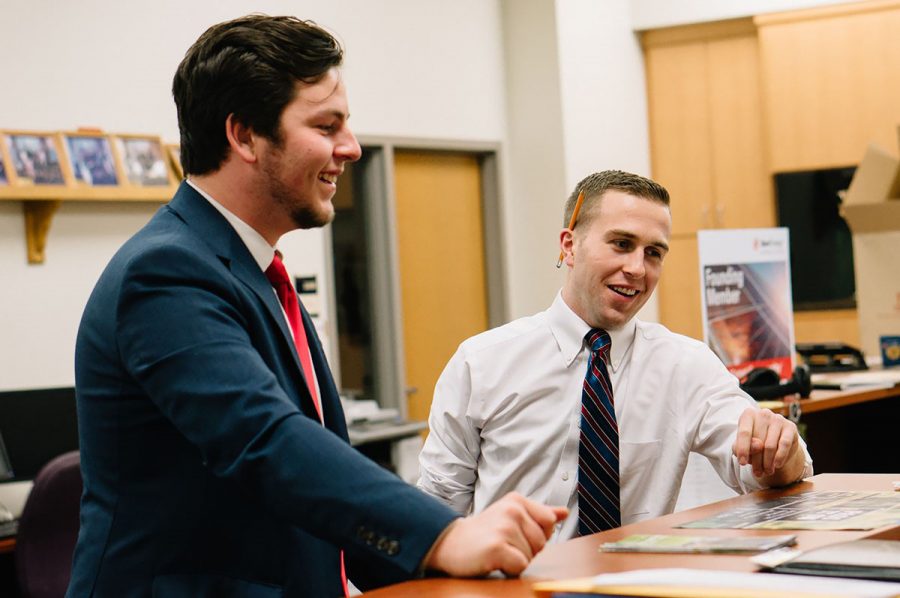Student Senate joins organizations in support of railroad lines
Senate will discuss a bill seeking to change campus tobacco policy
More stories from Hillary Smith
Photo by Amanda Thao
Intergovernmental Affairs Director Nick Webber and Mascot Coordinator Scott Small co-authored the resolution supporting a rail line connecting Eau Claire to the Twin Cities.
Student Senate voted up a resolution supporting a project looking to establish a passenger rail service connecting Eau Claire, Wisconsin and St. Paul, Minnesota.
Efforts behind the plans are led mainly by the West Central Wisconsin Rail Coalition and has been in the works since 1999.
Intergovernmental Affairs Director Nick Webber, who co-authored and introduced the resolution, said Chippewa Valley Technical College, UW-Eau Claire, UW-River Falls, UW-Stout and numerous local businesses have backed the project. He said they are now looking to gain support from student organizations.
“Obviously there are a lot of questions right now,” Webber said. “We believe it will benefit the student body to continue to seek answers with the West Central Wisconsin Rail Coalition on what they can do for us as a student body.”
Several members of the body voiced their support and excitement for the project. Some of the benefits mentioned included attracting more Minnesota students to Eau Claire, increasing faculty and student mobility and stimulating the Chippewa Valley economy. Chief of Staff Katy McGarry referenced the Minneapolis Light Rail as an example of how rail lines can connect communities.
“I think this is a really good opportunity for ourselves as students to look forward to and support this type of travel and the development that will come with it,” she said.
The resolution passed without dissent.
Next week, Senate will discuss a bill aimed at redeveloping the campus tobacco policy.
Student Office of Sustainability Director Ethan Fuhrman introduced the bill. Last spring, Senate passed a referendum bill which was then rejected by the chancellor, who said he needed specific policy language in order to revise the campus tobacco policy.
Fuhrman said he believes this bill provides the best chance of meeting those standards; it seeks to create a nine-person special committee to review current policy and recommend updates and changes to the chancellor.
The policy has not been updated since 2012 and does not address alternative tobacco products such as hookah or electronic cigarettes. Fuhrman said the spring referendum was inspired by a 2015 survey which showed about 50 percent of students are exposed to secondhand smoke on at least a weekly basis.
“That shows that there’s some sort of need to revise current campus tobacco policy and bring it up to current needs,” he said, “but to also protect students who are vulnerable to tobacco smoke.”
Senate will vote on the bill next week; they will also start making appointments to fill the seven seats currently open.

